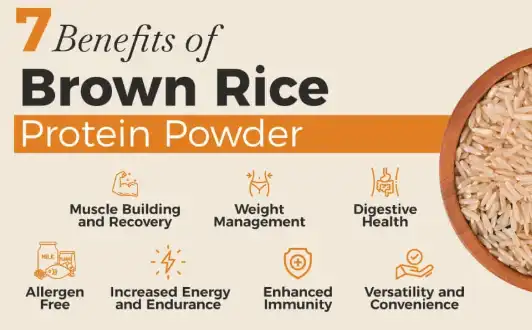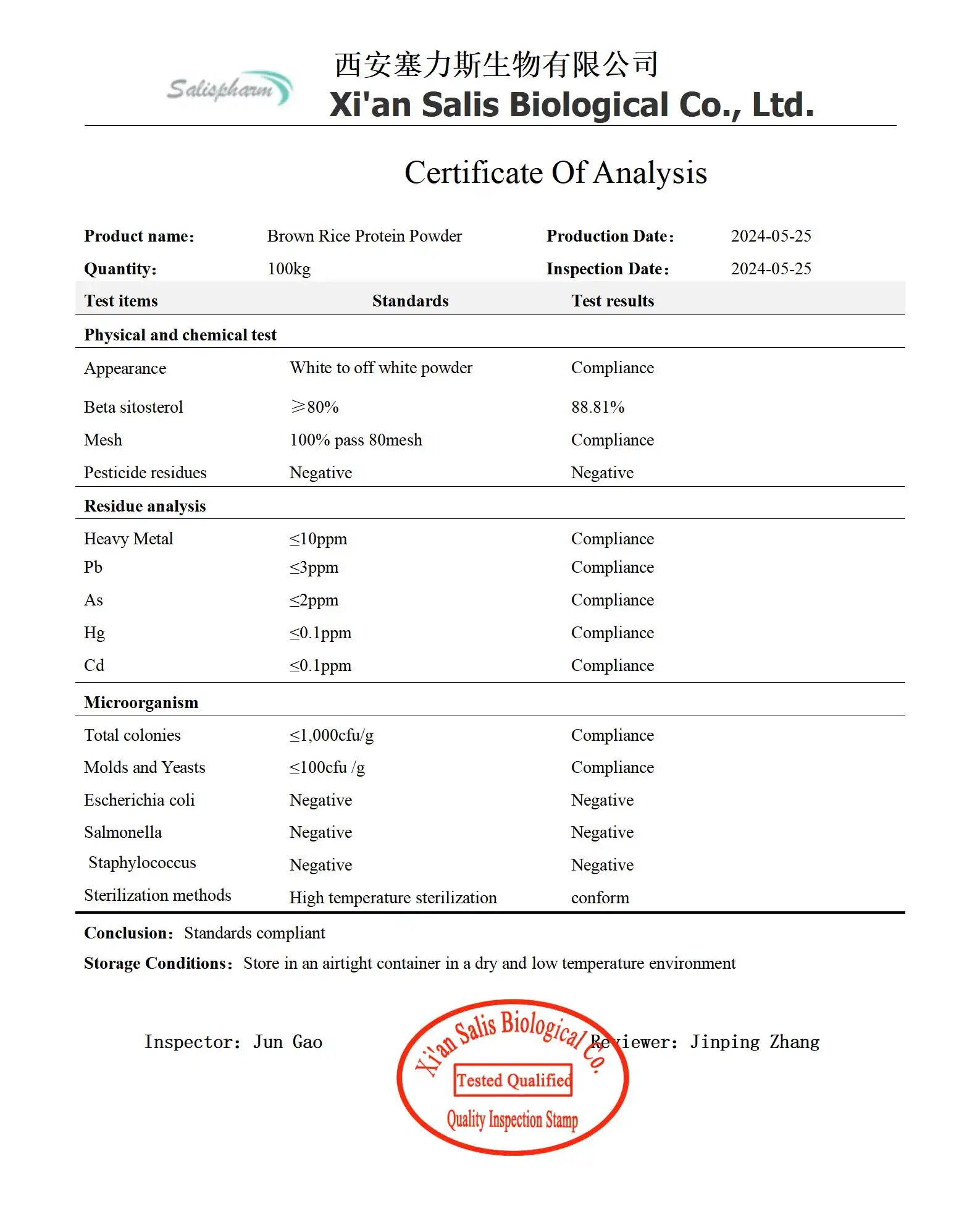Brown rice protein powder has gained popularity in recent years as a plant-based alternative to traditional protein supplements. Many people, especially those following vegetarian or vegan diets, are turning to this option for their protein needs. However, a common question that arises is whether brown rice protein powder is a complete protein. In this blog post, we'll explore this question in depth and discuss the nutritional profile of brown rice protein powder, its benefits, and how it compares to other protein sources.

What are the benefits of brown rice protein powder?
Brown rice protein powder offers numerous benefits, making it an attractive option for those seeking a plant-based protein supplement. First and foremost, it's an excellent source of protein, containing all nine essential amino acids that our bodies cannot produce on their own. This makes it a valuable addition to any diet, particularly for those who follow plant-based eating patterns.
One of the key advantages of brown rice protein powder is its hypoallergenic nature. Unlike many other protein sources, such as whey or soy, brown rice protein is less likely to cause allergic reactions or digestive issues. This makes it an ideal choice for individuals with food sensitivities or allergies.
Brown rice protein powder is also rich in complex carbohydrates, which provide sustained energy throughout the day. This can be particularly beneficial for athletes or those engaging in regular physical activity. Additionally, it contains fiber, which aids in digestion and promotes a feeling of fullness, potentially supporting weight management efforts.
Another notable benefit of brown rice protein powder is its low fat content. This makes it an excellent option for those looking to increase their protein intake without adding excessive calories or fat to their diet. The powder is also naturally gluten-free, making it suitable for individuals with celiac disease or gluten sensitivity.
Brown rice protein powder is also rich in antioxidants, particularly gamma-oryzanol, which has been linked to various health benefits, including improved cholesterol levels and reduced inflammation. These antioxidants can help protect cells from oxidative stress and support overall health and well-being.
Furthermore, brown rice protein powder is environmentally friendly and sustainable. The production of plant-based proteins generally requires fewer resources and produces fewer greenhouse gas emissions compared to animal-based protein sources. This makes it an appealing choice for environmentally conscious consumers.
How does brown rice protein powder compare to whey protein?
When comparing brown rice protein powder to whey protein, it's essential to consider various factors such as nutritional profile, digestibility, and potential health effects. Whey protein, derived from milk, has long been considered the gold standard for protein supplements due to its complete amino acid profile and high biological value. However, brown rice protein has emerged as a compelling alternative, especially for those seeking plant-based options.
In terms of protein content, both brown rice and whey protein powders typically contain similar amounts of protein per serving, usually ranging from 20 to 25 grams. However, the amino acid profiles differ slightly. Whey protein is particularly rich in branched-chain amino acids (BCAAs), especially leucine, which is crucial for muscle protein synthesis. Brown rice protein, while containing all essential amino acids, has a slightly lower concentration of certain amino acids, particularly lysine.
Digestibility is another important factor to consider. Whey protein is known for its rapid absorption rate, making it an excellent choice for post-workout recovery. Brown rice protein, on the other hand, is digested more slowly, which can be beneficial for providing a sustained release of amino acids over time. This slower digestion may also contribute to increased feelings of fullness and satiety.
In terms of muscle building and recovery, both proteins have shown promising results. While whey protein has traditionally been favored for its leucine content and fast absorption, studies have shown that brown rice protein can be equally effective in promoting muscle growth and recovery when consumed in appropriate amounts. A 2013 study published in the Nutrition Journal found that brown rice protein isolate supplementation was as effective as whey protein in supporting muscle recovery and growth after resistance exercise.
Allergenicity is an area where brown rice protein has a distinct advantage. Whey protein, being derived from milk, can cause digestive issues or allergic reactions in individuals with lactose intolerance or milk allergies. Brown rice protein, being plant-based and naturally gluten-free, is less likely to cause such reactions, making it a more suitable option for those with dietary restrictions or sensitivities.
From an environmental perspective, brown rice protein generally has a lower environmental impact compared to whey protein. The production of plant-based proteins typically requires less water, land, and energy, and produces fewer greenhouse gas emissions than animal-based proteins. This makes brown rice protein a more sustainable choice for environmentally conscious consumers.
Can brown rice protein powder be used as a meal replacement?
Brown rice protein powder can indeed be used as a meal replacement, but it's important to understand its nutritional profile and how to properly incorporate it into a balanced diet. While it provides a good source of protein and some carbohydrates, it lacks many other essential nutrients that a complete meal would typically provide.
When considering using brown rice protein powder as a meal replacement, it's crucial to ensure that you're getting a well-rounded nutritional profile. A balanced meal should include not only protein but also carbohydrates, healthy fats, vitamins, minerals, and fiber. While brown rice protein powder provides protein and some carbohydrates, it falls short in providing adequate amounts of other essential nutrients.
To effectively use brown rice protein powder as part of a meal replacement, it's recommended to combine it with other nutrient-dense foods. For example, you could blend the protein powder with fruits, vegetables, nuts or seeds, and a plant-based milk to create a more complete meal. This approach helps to ensure you're getting a wider range of nutrients, including vitamins, minerals, and healthy fats that are essential for overall health and well-being.
It's also important to consider the calorie content when using brown rice protein powder as a meal replacement. A typical serving of the powder contains around 100-120 calories, which is generally not sufficient for a full meal for most adults. To make it a more substantial meal replacement, you may need to increase the serving size or add other calorie-dense, nutrient-rich foods to your shake or smoothie.
While brown rice protein powder can be a convenient option for those looking to increase their protein intake or replace occasional meals, it's not recommended to rely on it as a sole source of nutrition for extended periods. A varied diet that includes whole foods is crucial for meeting all of your nutritional needs and maintaining optimal health.
If you're considering using brown rice protein powder as a meal replacement regularly, it's advisable to consult with a registered dietitian or healthcare professional. They can help you develop a balanced meal plan that incorporates the protein powder while ensuring you're meeting all of your nutritional requirements.
Conclusion
While brown rice protein powder can be used as part of a meal replacement strategy, it should be combined with other nutrient-dense foods to create a more complete and balanced meal. It's an excellent option for increasing protein intake, especially for those following plant-based diets, but should not be relied upon as the sole source of nutrition for extended periods.
If you are also interested in this product and want to know more product details, or want to know about other related products, please feel free to contact lea_slsbio@163.com,WhatsApp+86 13193326505.

References
1. Joy, J. M., et al. (2013). The effects of 8 weeks of whey or rice protein supplementation on body composition and exercise performance. Nutrition Journal, 12(1), 86.
2. Kalman, D. S. (2014). Amino Acid Composition of an Organic Brown Rice Protein Concentrate and Isolate Compared to Soy and Whey Concentrates and Isolates. Foods, 3(3), 394-402.
3. Babault, N., et al. (2015). Pea proteins oral supplementation promotes muscle thickness gains during resistance training: a double-blind, randomized, Placebo-controlled clinical trial vs. Whey protein. Journal of the International Society of Sports Nutrition, 12(1), 3.
4. Rutherfurd, S. M., et al. (2015). Protein digestibility-corrected amino acid scores and digestible indispensable amino acid scores differentially describe protein quality in growing male rats. The Journal of Nutrition, 145(2), 372-379.
5. van Vliet, S., et al. (2015). The skeletal muscle anabolic response to plant- versus animal-based protein consumption. The Journal of Nutrition, 145(9), 1981-1991.
6. Gorissen, S. H., et al. (2018). Protein content and amino acid composition of commercially available plant-based protein isolates. Amino Acids, 50(12), 1685-1695.

